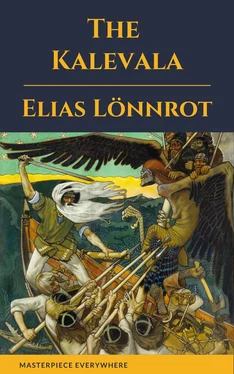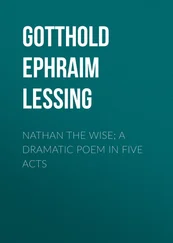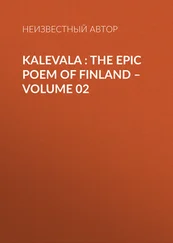1 ...6 7 8 10 11 12 ...24 In my dwelling-place for ages.
Shall I bring these songs together
From the cold and frost collect them?
Shall I bring this nest of boxes,
Keepers of these golden legends,
To the table in my cabin,
Underneath the painted rafters,
In this house renowned and ancient?
Shall I now these boxes open,
Boxes filled with wondrous stories?
Shall I now the end unfasten
Of this ball of ancient wisdom,
These ancestral lays unravel?
Let me sing an old-time legend,
That shall echo forth the praises
Of the beer that I have tasted,
Of the sparkling beer of barley.
Bring to me a foaming goblet
Of the barley of my fathers,
Lest my singing grow too weary,
Singing from the water only.
Bring me too a cup of strong-beer,
It will add to our enchantment,
To the pleasure of the evening,
Northland's long and dreary evening,
For the beauty of the day-dawn,
For the pleasure of the morning,
The beginning of the new-day.
Often I have heard them chanting,
Often I have heard them singing,
That the nights come to us singly,
That the Moon beams on us singly,
That the Sun shines on us singly;
Singly also, Wainamoinen,
The renowned and wise enchanter,
Born from everlasting Ether
Of his mother, Ether's daughter.
Rune I. Birth of Wainamoinen.
IN primeval times, a maiden,
Beauteous Daughter of the Ether,
Passed for ages her existence
In the great expanse of heaven,
O'er the prairies yet enfolded.
Wearisome the maiden growing,
Her existence sad and hopeless,
Thus alone to live for ages
In the infinite expanses
Of the air above the sea-foam,
In the far outstretching spaces,
In a solitude of ether,
She descended to the ocean,
Waves her coach, and waves her pillow.
Thereupon the rising storm-wind
Flying from the East in fierceness,
Whips the ocean into surges,
Strikes the stars with sprays of ocean
Till the waves are white with fervor.
To and fro they toss the maiden,
Storm-encircled, hapless maiden;
With her sport the rolling billows,
With her play the storm-wind forces,
On the blue back of the waters;
On the white-wreathed waves of ocean,
Play the forces of the salt-sea,
With the lone and helpless maiden;
Till at last in full conception,
Union now of force and beauty,
Sink the storm-winds into slumber;
Overburdened now the maiden
Cannot rise above the surface;
Seven hundred years she wandered,
Ages nine of man's existence,
Swam the ocean hither, thither,
Could not rise above the waters,
Conscious only of her travail;
Seven hundred years she labored
Ere her first-born was delivered.
Thus she swam as water-mother,
Toward the east, and also southward,
Toward the west, and also northward;
Swam the sea in all directions,
Frightened at the strife of storm-winds,
Swam in travail, swam unceasing,
Ere her first-born was delivered.
Then began she gently weeping,
Spake these measures, heavy-hearted:
"Woe is me, my life hard-fated!
Woe is me, in this my travail!
Into what have I now fallen?
Woe is me, that I unhappy,
Left my home in subtle ether,
Came to dwell amid the sea-foam,
To be tossed by rolling billows,
To be rocked by winds and waters,
On the far outstretching waters,
In the salt-sea's vast expanses,
Knowing only pain and trouble!
Better far for me, O Ukko!
Were I maiden in the Ether,
Than within these ocean-spaces,
To become a water-mother!
All this life is cold and dreary,
Painful here is every motion,
As I linger in the waters,
As I wander through the ocean.
Ukko, thou O God, up yonder,
Thou the ruler of the heavens,
Come thou hither, thou art needed,
Come thou hither, I implore thee,
To deliver me from trouble,
To deliver me in travail.
Come I pray thee, hither hasten,
Hasten more that thou art needed,
Haste and help this helpless maiden!"
When she ceased her supplications,
Scarce a moment onward passes,
Ere a beauteous duck descending,
Hastens toward the water-mother,
Comes a-flying hither, thither,
Seeks herself a place for nesting.
Flies she eastward, flies she westward,
Circles northward, circles southward,
Cannot find a grassy hillock,
Not the smallest bit of verdure;
Cannot find a spot protected,
Cannot find a place befitting,
Where to make her nest in safety.
Flying slowly, looking round her,
She descries no place for resting,
Thinking loud and long debating,
And her words are such as follow:
"Build I in the winds my dwelling,
On the floods my place of nesting?
Surely would the winds destroy it,
Far away the waves would wash it."
Then the daughter of the Ether,
Now the hapless water-mother,
Raised her shoulders out of water,
Raised her knees above the ocean,
That the duck might build her dwelling,
Build her nesting-place in safety.
Thereupon the duck in beauty,
Flying slowly, looking round her,
Spies the shoulders of the maiden,
Sees the knees of Ether's daughter,
Now the hapless water-mother,
Thinks them to be grassy hillocks,
On the blue back of the ocean.
Thence she flies and hovers slowly,
Lightly on the knee she settles,
Finds a nesting-place befitting,
Where to lay her eggs in safety.
Here she builds her humble dwelling,
Lays her eggs within, at pleasure,
Six, the golden eggs she lays there,
Then a seventh, an egg of iron;
Sits upon her eggs to hatch them,
Quickly warms them on the knee-cap
Of the hapless water-mother;
Hatches one day, then a second,
Then a third day sits and hatches.
Warmer grows the water round her,
Warmer is her bed in ocean,
While her knee with fire is kindled,
And her shoulders too are burning,
Fire in every vein is coursing.
Quick the maiden moves her shoulders,
Shakes her members in succession,
Shakes the nest from its foundation,
And the eggs fall into ocean,
Dash in pieces on the bottom
Of the deep and boundless waters.
In the sand they do not perish,
Not the pieces in the ocean;
But transformed, in wondrous beauty
All the fragments come together
Forming pieces two in number,
One the upper, one the lower,
Equal to the one, the other.
From one half the egg, the lower,
Grows the nether vault of Terra:
From the upper half remaining,
Grows the upper vault of Heaven;
From the white part come the moonbeams,
From the yellow part the sunshine,
From the motley part the starlight,
From the dark part grows the cloudage;
And the days speed onward swiftly,
Quickly do the years fly over,
From the shining of the new sun
From the lighting of the full moon.
Still the daughter of the Ether,
Swims the sea as water-mother,
With the floods outstretched before her,
And behind her sky and ocean.
Finally about the ninth year,
In the summer of the tenth year,
Lifts her head above the surface,
Lifts her forehead from the waters,
And begins at last her workings,
Now commences her creations,
On the azure water-ridges,
On the mighty waste before her.
Where her hand she turned in water,
There arose a fertile hillock;
Wheresoe'er her foot she rested,
Читать дальше












